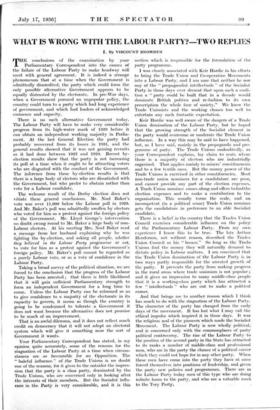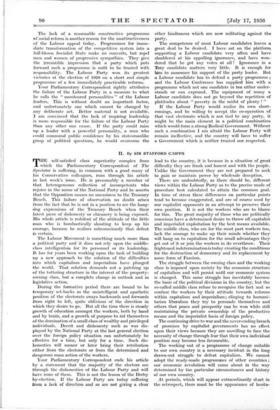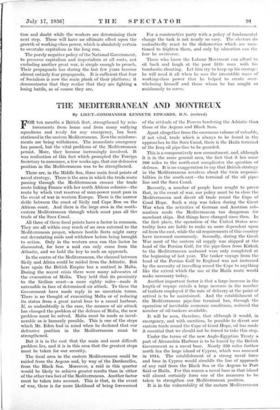WHAT IS WRONG WITH THE LABOUR PARTY? TWO REPLIES
I. By VISCOUNT SNOWDEN THE conclusions of the examination by your Parliamentary Correspondent into the causes of the failure of the Labour Party to make headway will meet with general agreement. It is indeed a strange phenomenon• that at a time when the Government is admittedly 'discredited, the party which could form the only possible alternative Government appears to be equally distrusted by the electorate. In pre-War days, when a Government pursued an unpopular policy, the country could turn to a party which had long experience of government, and which had leaders of acknowledged eminence and capacity.
There is no such alternative Government today. The Labour Party will have to make very considerable progress from its high-water mark of 1929 before it can obtain an independent working majority in Parlia- ment. At the last General Election the party had probably recovered from its losses in 1931, and the general results showed that it was not gaining recruits as it had done between 1922 and 1929. Recent by- election results show that the party is not increasing its poll at a time when it ought to be attracting voters who are disgusted with the conduct of the Government. The. inference from these by-election results is that there is a large body of electors who are dissatisfied with the Government, but who prefer to abstain rather than vote for a Labour candidate.
The welcome result of the Derby election does not vitiate these general conclusions. Mr. Noel Baker's vote was over 11,000 below the Labour poll in 1929. And Mr. Baker's poll was admittedly swollen by electors who voted for him as a protest against the foreign policy of the Government. Mr. Lloyd George's interyention no doubt swung round to Mr. Baker a large body of non- Labour electors. At his meeting Mrs. Noel Baker read a message from her husband explaining why he was fighting the by-election, and asking all people, whether they, believed in the Labour Party programme or not, to vote for him as a protest against the Government's foreign policy. , Mr. Baker's poll cannot be regarded as, a purely Labour vote, or as a vote of confidence in the Labour Party, „ Taking a broad survey of the political situation, we are, forced to the conclusion that the progress of the Labour Party'has been arrested ; that there, is little likelihood that it will gain sufficient Parliamentary strength to form an independent Government for a long time to come. Unless the Labour Party can be reformed so as, to give confidence to a majority of the electorate in its capacity to govern, it seems as though the country is going to be condemned to tolerate • a Government it does not want because the alternative does 'not promise to be much of an improvement.
That is an awful dilemma, and it does not reflect much credit on democracy that it will not adopt an electoral, system which will give it something near the sort of Government it wants.
Your Parliamentary Correspondent. has stated, in my opinion quite accurately, . some of the reasons for the stagnation of the Labour Party at a time when circum- stances are so favourable , for an Opposition.. The " baleful influence.'! of the Trade Unions is no doubt. one of the reasons, for it gives to the outsider the impres- sion that the party is a class party, dominated by the Trade Unions, who are concerned only in looking after. the. interests of their. members, But the -Socialist influ- ence. in the. Party is . very considerable, and it. is this section which is responsible for the formulation of the party programme.
I was closely, associated with Keir Hardie in his efforts to bring the Trade Union and Co-operative Movements into a Labour Party, and I am sure that neither he nor any of the " propagandist intellectuals " of the Socialist Party in those days ever dreamt that upon such a coali- tion a " party could be built that in a decade would dominate British politics and re-fashion to its own prescription the whole face of society." We knew the Trade Unionists and the working classes too well to entertain any such fantastic expectation.
Keir Hardie was well aware of the dangers of a Trade Union domination of the Labour Party, but he hoped that the growing strength of the Socialist clement in the party would overcome or moderate the Trade Union influence. In a way this may be said to have happened, but, as I have said, mainly in the propaganda and pro- gramme of, party. The Trade Unions undoubtedly, as your Correspondent explains, lay claim to seats where there is a majority of electors who are industrially organised. That applies mainly to miners' constituencies and to a few textile ones. But the money power of the Trade Unions is exercised in other constituencies. Most non-trade union nominees for a candidature are poor, and cannot provide any part of the election expenses.
A Trade Union nominee comes along and offers to find the election expenses and to make a contribution to the organisation. This usually turns the scale, and an, incompetent. (in a political sense) Trade Union nominee gets the candidature in preference to an able Socialist. candidate.
7'here is a belief in the country that the Trades Union Council exercises considerable influence on the policy.
of the Parliamentary Labour Party. From my owns experience I know this to be true. The late Arthur. Henderson, not without reason, described the Trades Union Council as his " bosses." So long as the Trades Unions find the money they will naturally demand to. dictate policy in Labour matters. I am convinced that the Trade Union domination of the Labour Party is in two ways partly responsible for the arrested growth of the party. It prevents the party from making progress in the rural areas where trade unionism is not popular ; and it gives an impression to many middle-class people that it is a working-class party which has attracted a. few intellectuals " who are out to make a political career.
And that brings me to another reason which I think has much to do with the stagnation of the Labour Party.
The character of the party has changed from the early days of the movement. It has lost what I may call the ethical impulse which inspired it in those days. It was• the religious zeal of the pioneers which made the Socialist Movement. The Labour Party is now wholly political,.
and is concerned only with the commonplaces of party political controversy. The rise of the Labour Party to the position of the second party in the State has attracted to its ranks a number of middle-class and professional men, who see in the party the chance of a political career which they could not hope for in any other party. When, these men* have come into the party they have at once forced themselves into positions of leadership, and given the. party- new policies and programmes. There are in the Labour Party today men of this type who are doing infinite harm to the party, and who are a. valuable asset
to the Tory Tarty. .
The lack of a reasonable constructive programme of social reform is another reason for the unattractiveness of the Labour appeal today. Programmes for imme- diate transformation of the competitive system into a full-blown Socialist State make no converts, but repel men and women of progressive sympathies. They give the irresistible impression that a party which puts forward such a programme is unfit to be trusted with responsibility. The Labour Party won its greatest victories at the election of 1929 on a short and simple programme of a few immediately practicable reforms.
Your Parliamentary Correspondent rightly attributes the failure of the Labour Party in a measure to what he calls the " uncoloured personalities " of the Labour leaders. This is without doubt an important factor, and unfortunately one which cannot be changed by any deliberate act. Better material is not available. I am convinced that the lack of inspiring leadership is more responsible for the failure of the Labour Party than any other one cause. If the party could raise up a leader with a powerful personality, a man who could command public confidence by his statesmanlike grasp of political questions, he would overcome the other hindrances which are now militating against the party.
The competence of most Labour candidates leaves a great deal to be desired. I have sat on the platform supporting a Labour candidate very often and have shuddered at his appalling ignorance, and have won- dered that he got any votes at all ! Ignorance in a Tory candidate matters very little. It is enough for him to announce his support of the party leader. But a Labour candidate has to defend a party programme ; and the Labour Conference has supplied him with a programme which not one candidate in ten either under- stands or can expound. The equipment of many a Labour candidate does not go beyond the repetition of platitudes about " poverty in the midst of plenty ! "
If the Labour Party would realise its own short- comings, and be willing to accept the co-operation of that vast electorate which is not tied to any party, it might be the main element in a political combination which would form a strong Radical Government. Without such a combination I am afraid the Labour Party will remain ineffective, and the country will have to suffer a Government which. is neither trusted nor respected.
II. By SIR ST AFFORD CRIPPS THE self-satisfied class superiority complex from which the Parliamentary Correspondent of The Spectator is suffering, in common with a good many of his Conservative colleagues, runs through his article in last week's issue. He is presumably a member of that heterogeneous collection of incompetents who rejoice in the name of the National Party and he asserts that the Opposition causes no uneasiness to the Treasury Bench. This failure of observatidn no doubt arises from the fact that he is not in a position to see the hang- dog expressions of the Treasury Bench when their latest piece of dishonesty or chicanery is being exposed. His whole article is redolent of the attitude of the little man who is bombastically shouting to keep up his courage, because he realises subconsciously that defeat is certain.
The Labour Movement is something much more than a political party and it does not rely upon the middle- class intelligentsia for -its personnel or its leadership. It has for years been working upon the task of building up a new approach to the solution of the difficulties into which capitalism and imperialism have plunged the world. That solution demands not a patching up of the tottering structure in the interest of the property- owning class, but a complete change in outlook and in legislative action.
During the formative period there are bound- to be temporary set-backs as the unintelligent and apathetic position of the electorate sways backwards and forwards from right to left, quite oblivious of the direction in which they desire to go. But all the time there is steady growth of education amongst the workers, both by hand and by brain, and a growth of purpose to rid themselves of the domination of a small class of wealthy and privileged individuals. Deceit and dishonesty such as was dis- played by the National Party at the last general election over the foreign policy situation can unfortunately be effective for a time, but only for a time. Such dis- honesties will sooner or later bring their retribution either from the electorate or from the determined and dangerous mass action of the workers.
Your Parliamentary Correspondent ends his article by a statement that the majority of the electors see through the dishonesties of the Labour Party and will have none of them. This is not the lesson of the Derby by-election. If the Labour Party are today suffering from a lack of direction and so are not giving a clear lead to the country, it is because in a situation of great difficulty they are frank and honest and with the people. Unlike the Government they are not prepared to seek to gain or maintain power by wholesale deception.
There are undoubtedly, as there should be, different views within the Labour Party as to the precise mode of procedure best calculated to attain the common goal.
In time of stress these differences on particular points tend to become exaggerated, and are of course used by our capitalist opponents in an attempt to preserve their own position. It is not the workers who are to blame for this. The great majority of those who are politically conscious have a determined desire to throw off capitalist and imperialist exploitation by the best means available. The middle class, who are for the most part workers too, lack the courage to make up their minds whether they will hang on to capitalism for the small advantages they get out of it or join the workers in its overthrow. Their frightened indetermination is today creating the conditions for the destruction of democracy and its replacement by some form of Fascism.
The struggle between the owning class and the working class is imposed upon society by the economic structure of capitalism and will persist until our economic system is changed. This same struggle has inevitably become the basis of the political divisions in the country, but the so-called middle class refuse to recognise the fact and so confuse the workers by their attitude towards reforms within capitalism and imperialism; clinging to humani- tarian liberalism they try to persuade themselves and others that peace and prosperity can be won while still maintaining the private ownership of the productive means and the imperialist basis of foreign policy.
The continuing drive to war and the never-ending breach of promises by capitalist governments has no effect upon their views because they are unwilling to face the necessity of change through fear that their own individual position may become less favourable.
The working out of a programme of change suitable to our own country is a necessary incident in the long drawn-out struggle to defeat capitalism. We cannot adopt the ready-made programmes of other countries our economic revolution will come about in the way determined by the particular circumstances and history of our own country.
At periods, which will appear extraordinarily short in the retrospect, there must be the appearance of hesita- tion and doubt while the workers are determining their next step. These will have no ultimate effect upon the growth of working-class power, which is absolutely certain to overtake capitalism in the long run.
The purely negative policy of the National Government, to preserve capitalism and imperialism at all costs, not excluding another great war, is simple enough to preach. Their propaganda has during the last few years become almost entirely fear propaganda. It is sufficient that fear of Socialism is now the main plank of their platform ; it demonstrates that they realise that they are fighting a losing battle, as of course they are. For a constructive party with a policy of fundamental change the task is not nearly so easy. The electors do undoubtedly react to the dishonesties which are men- tioned to frighten them, and only by education can the fear be overcome.
Those who know the Labour Movement can afford to sit back and laugh at the poor little man with his bombastic shouting. Let him try to keep up his courage; he will need it all when he sees the irresistible wave of working-class power that he helped to create over- whelming himself and those whom he has sought so assiduously to serve.
















































 Previous page
Previous page